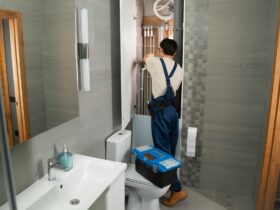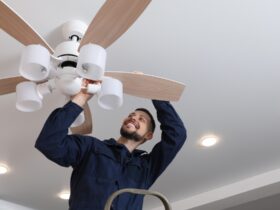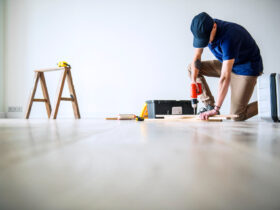You probably don’t think much about your plumbing until something goes wrong. Whether it’s a dripping faucet, a clogged drain, or worse, a burst pipe, plumbing problems have a way of showing up when you least expect them. And if you live in Clayton, MO, you know that the mix of older homes and changing seasons can put extra pressure on your plumbing system. From freezing winter temperatures to heavy spring rains, your pipes face plenty of challenges throughout the year.
What many homeowners don’t realize is that most plumbing emergencies can be prevented with simple, regular care. You don’t have to be a plumbing expert to keep your system in good shape. A few easy habits, combined with the right professional services when needed, can go a long way in protecting your home from costly damage and keeping your water flowing smoothly.
Let’s start by looking at one of the most important, but often overlooked, parts of plumbing maintenance: keeping your home’s water supply safe from contamination.
Protecting Your Water Supply with Professional Backflow Services
Clean, safe water is something you depend on every day. But did you know that under certain conditions, your home’s water could become contaminated without warning? It happens when backflow occurs. Backflow is when dirty water or other contaminants flow backward into your clean water supply, usually due to a sudden change in water pressure. It can pose serious health risks if left unaddressed.
Backflow prevention is especially important in areas like Clayton, MO, where both residential and commercial properties are required to meet local plumbing codes to keep the community’s water supply safe. That’s why many homeowners choose to schedule professional backflow services in Clayton, MO, to have their systems tested and protected. Certified plumbers in the area can install, test, and maintain backflow prevention devices, making sure your drinking water stays clean and your plumbing system stays up to code. It’s one of the best steps you can take to protect your home and your family’s health.
Regularly Checking for Leaks, Big and Small
One of the simplest things you can do to care for your plumbing is to keep an eye out for leaks. Even a small drip from a faucet or a slow leak under the sink can waste gallons of water over time and lead to bigger problems like water damage or mold. Make it a habit to check your kitchen, bathrooms, laundry room, and basement for any signs of moisture or stains.
If you notice water pooling where it shouldn’t be or hear dripping sounds when the fixtures are off, take action right away. Fixing minor leaks early can save you from expensive repairs later. And if you’re not sure where the water is coming from, a professional plumber can help you find the source and take care of it before it gets worse.
Keeping Drains Flowing Freely
Clogged drains are more than just a nuisance. They can put stress on your plumbing system and lead to unpleasant odors or even backups. Kitchen sinks often get clogged with grease or food scraps, while bathroom drains tend to collect hair and soap scum.
To keep things running smoothly, avoid pouring grease or oil down the kitchen sink, and use drain strainers in your sinks and tubs to catch hair and debris. You can also flush your drains with hot water regularly to help prevent buildup. If you do run into a stubborn clog, skip the chemical drain cleaners—they can damage your pipes over time. Instead, call a professional who can clear the blockage safely and effectively.
Maintaining Your Water Heater for Long-Term Efficiency
Your water heater works hard to provide hot water for showers, laundry, and dishes. But over time, sediment can build up inside the tank, making it less efficient and shortening its lifespan. To keep your water heater in top shape, it’s a good idea to drain and flush it once or twice a year. This simple step helps remove sediment and keeps your water heater running smoothly.
You should also check the temperature of your water heater. Keeping it set to around 120 degrees Fahrenheit is usually hot enough for daily use and helps reduce the risk of scalding. Don’t forget to check for any signs of leaks or rust around the tank, as these could be signs that it’s time for maintenance or replacement.
Insulating Pipes Before Cold Weather Hits
Winter can be tough on your plumbing, especially if you have exposed pipes in unheated areas like your basement, attic, or garage. When temperatures drop, these pipes are at risk of freezing, and frozen pipes can burst, causing major water damage.
Before winter arrives, take the time to insulate any exposed pipes with foam pipe insulation. It’s an easy and affordable way to protect them from freezing. You can also keep cabinet doors open in the kitchen and bathroom to let warm air circulate around the pipes. On especially cold nights, letting your faucets drip slightly can help keep water moving and prevent freezing.
Understanding the Importance of Water Pressure Management
While you might love the feeling of strong water pressure in your shower, pressure that’s too high can actually damage your plumbing system over time. It puts extra stress on pipes, joints, and fixtures, increasing the risk of leaks or bursts.
You can check your home’s water pressure using a simple pressure gauge, which you can find at most hardware stores. Ideally, your water pressure should be between 40 and 60 psi. If it’s higher than that, you might want to have a plumber install a pressure-reducing valve to protect your plumbing and extend the life of your system.
Scheduling Professional Plumbing Inspections
While there’s a lot you can do on your own, nothing beats the peace of mind that comes from a professional plumbing inspection. A licensed plumber can check your entire system for hidden issues you might not notice, like small leaks behind walls, aging pipes, or early signs of corrosion.
Scheduling an annual inspection is a smart way to catch problems before they turn into emergencies. It also gives you a chance to ask questions and get advice on how to keep your plumbing in great shape year-round.
Taking care of your home’s plumbing doesn’t have to be complicated. By following a few simple steps, like scheduling backflow services, checking for leaks, keeping your drains clear, maintaining your water heater, insulating pipes, managing water pressure, and booking regular inspections, you can avoid costly repairs and keep your plumbing working smoothly all year long.
Remember, while many tasks can be handled with a little DIY effort, some services, like backflow prevention, are best left to experienced professionals who can ensure your home stays safe and up to code. Start small, stay consistent, and you’ll enjoy a worry-free plumbing system for years to come.







Leave a Reply